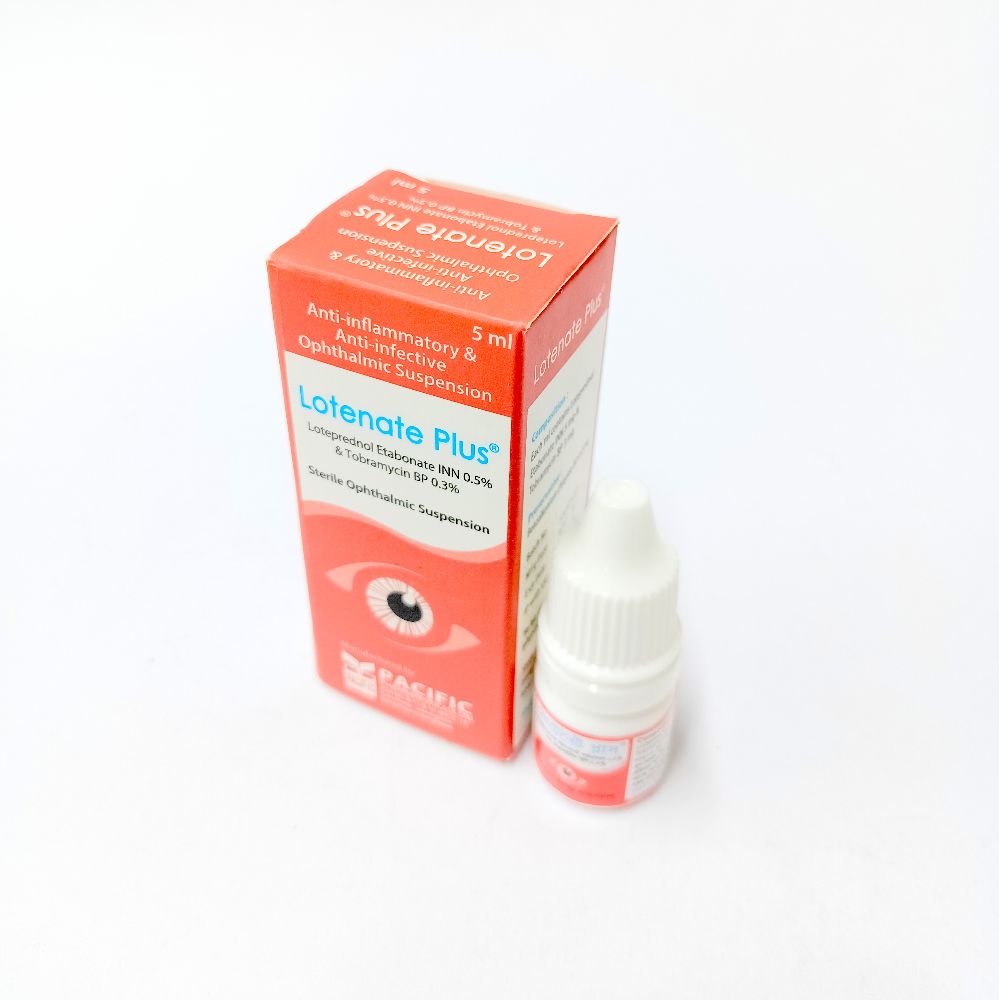
Type:5ml drop
Generic Name:Loteprednol Etabonate 0.5% + Tobramycin 0.3% Eye prep
Manufacturer:Pacific Pharmaceuticals Ltd.
Price:৳200.00
Keratitis, Allergic conjunctivitis, Iritis, Ocular inflammation, Bacterial ocular infection, Cyclitis
Ocular Inflammation Indicated for steroid-responsive ocular inflammations with risk of superficial bacterial infections Adult: Instill 1 or 2 drops of into the conjunctival sac of the affected eye(s) every 4 to 6 hours.; may use as frequently as q1-2hr during first 24-48 hr Decrease frequency of administration as signs and symptoms improve
Safety & efficacy not been established.
Hypersensitivity to any component of the formulation or to other corticosteroids Viral, mycobacterial & fungal eye infections
Loteprednol is a synthetic nonfluorinated glucocorticoid. It stimulates the production of lipicortins, proteins that modulate the activity of prostaglandins and leukotrienes. Tobramycin acts by binding to 30S ribosomal subunits thus interfering with bacterial protein synthesis. It is active against many aerobic gram-negative bacteria and some aerobic gram-positive bacteria but inactive against Chlamydia, fungi, viruses, and most anaerobic bacteria.
History of herpes simplex infections May exacerbate infections by nonsusceptible organisms Monitor IOP if used >10 d Bacterial keratitis reported from inadvertent contamination of multiple dose ophthalmic solution Immunosuppression resulting from prolonged use of steroid use may result in secondary bacterial and fungal infections; steroids may also mask symptoms of infections and enhance existing ocular infections Ocular hypertension and/or glaucoma reported with prolonged corticosteroid use Discontinue use if sensitivity reaction to tobramycin develops Corticosteroid use following cataract surgery may delay healing Lactation: Excretion in milk unknown; use caution
Prolonged use may increase: IOP, which may be associated with possible development of glaucoma and infrequent optic nerve damage; posterior sub-capsular cataract formation and perforation of the globe where there is thinning of the cornea or sclera. The most frequent adverse reactions to topical tobramycin are hypersensitivity and localized ocular toxicity, including lid itching and swelling and conjunctival erythema.
Enhanced neurotoxic and nephrotoxic effects w/ other aminoglycosides (e.g. amikacin, streptomycin), cefaloridine, viomycin, polymyxin B, colistin, cisplatin and vancomycin. Enhanced toxicity w/ potent diuretics (e.g. ethacrynic acid, furosemide). Prolonged secondary apnoea may occur when given to anaesthetised patients receiving neuromuscular blocking agents (e.g. succinylcholine, tubocurarine, decamethonium). Increased risk of nephrotoxicity w/ ciclosporin and other antibacterials (e.g. cephalosporins). Antagonistic effect w/ neostigmine and pyridostigmine. May potentiate the effect of warfarin and phenindione.